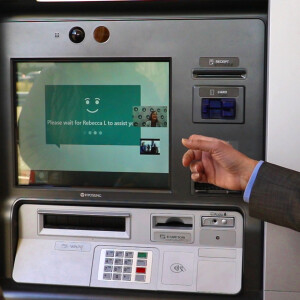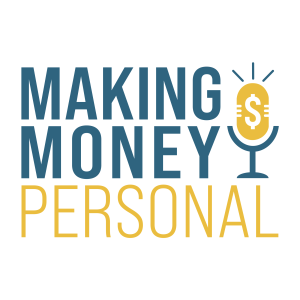Episodes

Tuesday Jan 23, 2024
Banking in a Box: Advantages of an ITM - Money Tip Tuesday
Tuesday Jan 23, 2024
Tuesday Jan 23, 2024
Have you ever wanted the convenient experience of an ATM with all the benefits of going into your local credit union branch?
With an Interactive Teller Machine, or ITM for short, you can do anything you’d do at an ATM, plus get access to other features that are usually only available in a branch. Learn how you can make this technology work for you!
Links:
Watch this video to learn more about ITMs!.
Check out TCU University for more financial education tips and resources!
Follow us on Facebook, Instagram and Twitter!
Learn more about Triangle Credit Union
Transcript:
Welcome to Money Tip Tuesday from the Making Money Personal podcast.
An ITM is essentially banking in a box. One of the most convenient features of an ITM is the ability to call for assistance from a live teller. Not a machine or artificial intelligence, the teller is a real person who is ready to help you with all your banking needs. This feature is only available during business hours, so don’t expect to have any late-night chats with your local teller. But if you visit during the available hours, a live teller can video chat with you to help you through your transaction or answer any questions about your accounts.
That’s not all ITMs can do. Like an ATM, ITMs let you deposit and withdraw cash, check account balances, and transfer money. You can also make loan or credit card payments and cash checks at an ITM, which you can’t do at an ATM.
ITMs give you the ability to do almost anything you’d do at the teller line and provide better service through features that ATMs have lacked for years. For example, ATMs are usually limited by set cash denominations with most distributing only $20 bills. With an ITM, you're offered an assortment of denominations to choose from so if you want a $50 bill, or a bunch of $1s, you can select the quantity of each when you take out cash. This can come in handy, especially if you need smaller bills like $5s but don’t have time to run into the branch.
Today, more and more people are doing their banking while on the go. This is where ITMs fit in for those of us living a busy lifestyle. If you’re in a rush, ITMs can sometimes be a quicker alternative to waiting in line at the bank or credit union. If there’s a long line to get to the tellers, just look for the ITM and do your transactions there. Many financial institutions also offer drive-up ITMs, which allows you to use the ITM from the comfort of your vehicle.
With all these features, the ITM truly is banking in a box. An ITM allows you to bank your way, offering the perfect blend of self-service banking and in-person assistance.
If there are any other tips or topics, you’d like us to cover, let us know at tcupodcast@trianglecu.org and don't forget to like and follow our Making Money Personal Facebook and Instagram to share your thoughts And remember to look for our sponsor, Triangle Credit Union on Facebook and LinkedIn.
Thanks for listening to today’s Money Tip Tuesday and be sure to check out our other tips and episodes on the Making Money Personal podcast.
Have a great day!

Thursday Jan 18, 2024
Episode 65: Take Charge of Your Credit Score in 2024
Thursday Jan 18, 2024
Thursday Jan 18, 2024
If you don't have a New Year's resolution, we've got one for you. In this episode, we'll be sharing tips on how to take charge of your credit score in 2024.
*For the most accurate and up to date disclosures about the products or services mentioned in this episode, visit our website at trianglecu.org
Links:
Learn how to check your credit score with Triangle's Better Checking account
Learn more about Triangle's Teen Club account and the teen builder loan
Check out more information from this Forbes article about how to improve your credit score
Check out the credit score simulator from NerdWallet to see how certain adjustments might affect your score
Check out TCU University for more financial education tips and resources!
Follow us on Facebook, Instagram and Twitter!
Learn more about Triangle Credit Union

Tuesday Jan 16, 2024
Protect Yourself, Protect Your Money - Money Tip Tuesday
Tuesday Jan 16, 2024
Tuesday Jan 16, 2024
We are in a value-added age for consumer products and services, and the financial industry is no exception. Checking accounts, for example, provide many bells and whistles, including identity protection for you and your family. Stay tuned to learn how to protect yourself and your money.
Links:
Learn more about Triangle's Better Checking account
Check out TCU University for more financial education tips and resources!
Follow us on Facebook, Instagram and Twitter!
Learn more about Triangle Credit Union
Transcript:
Welcome to Money Tip Tuesday from the Making Money Personal podcast.
With so many online banking services available today, consumers are no longer relegated to banks or credit unions at the end of the street. How does one decide which financial institution or product is right for them? Often that decision is decided by the value-added benefits of the financial product. As an example, let’s explore the value-added features and benefits of a checking account.
According to one financial blogger, value-added checking can take a standard checking account to new levels and adds a bit of a mission-focus.
At Triangle, our mission is to protect you and your money. For over 85 years, Triangle has maintained the strictest financial safety and soundness standards, so how does our Better Checking account, with IDProtect™, safeguard you and your money?
First, enrollment for identity theft protection is automatic. As soon as you open a Better Checking account, you have protection that covers you and your eligible family members, including elderly parents and dependent children, up to age 25, living in your household.
Second, IDProtect™ provides state-of-the-art detection and monitoring services around the clock. Time is of the essence in discovering identity theft, since the quicker it is discovered, the easier it is to recover from it. Identity monitoring is a critical component in discovering identity theft quickly in order to limit the amount of damage done.
For example, credit reports contain information about you, including what accounts you have and how you pay your bills. If an identity thief is opening credit accounts in your name, these accounts are likely to show up on your credit report. IDProtect’s ™ Credit File Monitoring service alerts you to these key changes.
Monitoring your credit report and score can be a tedious task, but it is imperative to keep a watchful eye out for fraudulent activity. With Better Checking, members rest easy with credit file monitoring and have access to a 3-in-1 credit report every 90 days.
Because lenders use credit scores to determine who qualifies for a loan, the interest rate they’ll get, and the credit limit, it’s important to monitor your credit score and keep track of changes and setbacks.
Third, Better Checking’s IDProtect™ offers recovery and resolution with a dedicated case manager.
Becoming a victim of identity fraud is a frightening, frustrating experience and it can happen to anyone at any time.
IDProtect™ is here to help during such a difficult time. Should you become a victim, a dedicated fraud specialist will be assigned to manage your case. Experienced recovery professionals will handle the recovery process until your identity is completely restored. Plus, IDProtect™ provides identity fraud expense reimbursement to cover expenses associated with restoring your identity.
Triangle Credit Union’s Better Checking, with IDProtect™, is available for those who are 18 and working or residing in the Hillsborough, Merrimack, Belknap, Rockingham, and Cheshire Counties of New Hampshire, as well as the Franklin, Worcester, Middlesex, and Essex Counties of Massachusetts. There is a nominal monthly fee of $4.99.
For a full list of features and value-added benefits, including identity protection for you and your qualifying members of your household, visit trianglecu.org/checking.
If you have any questions about today’s topic or suggestions for future topics, please email us at tcupodcast@trianglecu.org. For more great content, be sure to follow the Making Money Personal podcast wherever you listen to podcasts and the Making Money Personal podcast Facebook page.
Many thanks to our sponsor, Triangle Credit Union, voted Best Credit Union in NH, and to you for tuning in.
Have a great day everyone!

Tuesday Jan 09, 2024
How to Prepare for a No Spend January - Money Tip Tuesday
Tuesday Jan 09, 2024
Tuesday Jan 09, 2024
What resolutions have you made this year? Did you decide it’s time to start making some financial changes?
Financial resolutions aren’t for the faint of heart, and if you’re gearing up to make this year one of your best for financial discipline then there’s nothing better than a no-spend challenge to put yourself to the test.
Links:
Check out TCU University for more financial education tips and resources!
Follow us on Facebook, Instagram and Twitter!
Learn more about Triangle Credit Union
Transcript:
Welcome to Money Tip Tuesday from the Making Money Personal podcast.
The New Year has finally come and if you’re like many other people you’re likely sitting down to plan out some resolutions. When it comes to resolutions, people often choose to start a new diet or exercise routine while others set financial goals.
One goal you may want to consider participating in is a no-spend challenge.
A no spend challenge can last for a week, a month or even a year!
The purpose of a no spend challenge is to cut back on frivolous spending and have a better grasp of your financial habits.
How does a no spend challenge truly work?
Although the name suggests it, it’s impossible to not spend any money for a whole month.
You need to make sure you have your four walls—food, utilities, shelter, and transportation—covered.
Note: When we say food we mean groceries, not restaurants. Transportation refers to gas, public transportation, or anything else that is necessary to get you where you need to go
Once the four walls are taken care of, you are not allowed to spend money on anything else.
When’s the best time to start a no spend challenge?
This month, January, seems like the best month to start a no spend week or month for a few reasons:
January follows the holiday shopping season and on average, Americans spend approximately $997.73 on holiday shopping each year. Starting a no spend challenge in January is a great way to let your bank accounts and credit cards breathe a bit.
You might have received some restaurant or store gift cards over the holiday season that you can use during the challenge. This is essentially free money since it won’t be coming out of your accounts.
No spend challenges are easier to participate in when the weather is cold or snowy since poor weather conditions typically mean staying indoors, thus you are less tempted to go out and spend money.
How Do You Prepare?
Before you begin this challenge, it’s important to plan out all your meals, snacks, desserts, etc. to ensure they fit into your grocery budget for the duration of the challenge. Be resourceful and take inventory of your pantry, freezer, and fridge, that way you know exactly what you have.
To help yourself with online shopping, delete all shopping apps (Target, Amazon, Walmart, etc.) from your mobile devices. It may also be helpful to set up a filter on your email that will send marketing emails to a hidden email folder, that way you aren’t tempted to shop those deals.
One of the benefits of a no spend challenge is the money you save. Write down your plan for those saved funds. This will serve as a reminder and a motivator of your goals if you struggle during the challenge.
Obviously, if an emergency arises, that does not break the no spend challenge.
A no spend challenge may seem a bit daunting if this is a new idea for you, but once completed it is very rewarding.
If at first you don’t succeed, don’t be too hard on yourself and don’t be afraid to try again! We’re rooting for you.
If there are any other tips or topics you would like us to cover, let us know at tcupodcast@trianglecu.org. Like and follow our Making Money Personal FB and IG page and look for our sponsor, Triangle Credit Union on social media to share your thoughts.
Thanks for listening to today’s Money Tip Tuesday and be sure to check out our other tips and episodes on the Making Money Personal podcast.
Have a great day!

Tuesday Jan 02, 2024
Financial Resources for a Fresh New Year - Money Tip Tuesday
Tuesday Jan 02, 2024
Tuesday Jan 02, 2024
The new year has just begun! It’s the perfect time for a refresh, and the beginning of a new journey.
If you’re ready to get kicking this new year with a resolve to tackle your finances, now is the perfect time to scope out some reliable resources and learn effective strategies to accomplish whatever goal you seek to achieve this year.
Links:
Books:
The Total Money Makeover by Dave Ramsey
I will Teach You to Be Rich by Ramit Sethi
The Millionaire Next Door – by Thomas J Stanley
The Simple Path to Wealth – J.L. Collins
The Psychology of Money – Morgan Housel
YouTube Channels
Ramit Sethi I Will Teach You To Be Rich - YouTube
Dave Ramsey The Ramsey Show Highlights - YouTube
Graham Stephen Graham Stephan - YouTube
Khan Academy (Economics and Finance) Khan Academy - YouTube
Next Gen Personal Finance Next Gen Personal Finance - YouTube
Financial apps
You Need a Budget (YNAB)
EveryDollar
Good Budget
Pocket Guard
Use Triangle Credit Union's app for iOS or Android for Money Management tools
Check out TCU University for more financial education tips and resources!
Follow us on Facebook, Instagram and Twitter!
Learn more about Triangle Credit Union
Transcript:
Welcome to Money Tip Tuesday from the Making Money Personal podcast.
To improve and learn, you need to find credible resources. Today, there are so many different avenues to find anything you have an interest in.
This might be the year you want to increase your net worth, get your finances more organized, save more money, or get out of debt.
Fortunately, there are so many resources and tools available that cover any financial topic.
Here are some top resource categories with specific examples you should explore this year for financial knowledge, practice, and motivation.
The first one for all the readers out there is to select some finance books that explore popular themes to help you not only understand money but also how to lay out strategies for organizing it.
Total Money Makeover by Dave Ramsey
I Will Teach You to Be Rich by Ramit Sethi
The Millionaire Next Door by Thomas J Stanley
The Simple Path to Wealth by J.L. Collins
The Psychology of Money by Morgan Housel
This is just a short list of the many books out there covering finance topics. Doing a simple Google or Amazon search will bring up additional suggestions for you to explore. Also, if you prefer to listen to audiobooks, most of these are available in audio format.
Keep in mind, many authors also write articles on their social media and websites so explore their profiles for more insight, news, and other advice they may be sharing.
For anyone who likes to watch videos and tutorials, another resource is to seek out financial videos from good teachers and experts.
If this is your preferred learning method, YouTube can be a great resource. Many financial institutions and professionals host videos and discussions on their own channel where you can pick up some useful tips, advice and learn all about a variety of topics.
Explore the YouTube channels of some of these popular creators.
Ramit Sethi I Will Teach You to Be Rich - YouTube
Dave Ramsey The Ramsey Show Highlights - YouTube
Graham Stephen Graham Stephan - YouTube
Khan Academy (Economics and Finance) Khan Academy - YouTube
Next Gen Personal Finance Next Gen Personal Finance - YouTube
Don’t forget to also explore your financial institution and financial planner’s social channels for videos and posts sharing insight and advice.
The last resource you will want to use is a personal finance app.
It’s one thing to know what you need to do financially but another to make it work. Using a good mobile app or two will give you the tools to work a budget, set up goals, manage cash flow and pay off debt.
There are a few top-rated ones out there so browse the app store and see what you can find. Right off the bat here are a few of the popular ones to start your search.
You Need a Budget (YNAB) - This app helps you track spending and budget to pay off debt YNAB
EveryDollar - This app helps you with budgeting and cash management where you assign a use for every dollar you make EveryDollar - Ramsey (ramseysolutions.com)
Good Budget – This app offers a digital take on the envelope system to help you organize spending money Best Home Budget App for Android, iPhone, & Web | Good budget
Pocket Guard – This high rated app helps you simplify your money, track bills, and manage cash flow PocketGuard: Budgeting App & Finance Planner
Keep in mind that some of these apps mentioned require subscriptions and others may have free versions so explore the features of each to see which ones you are most likely to use for your financial management.
Also, make sure you get familiar with your financial institution and financial planner’s mobile apps. Many of them provide cool and useful tools for budgeting, debt payoff plans and net worth building.
If there are any other tips or topics you would like us to cover, let us know at tcupodcast@trianglecu.org. Like and follow our Making Money Personal FB and IG page and look for our sponsor, Triangle Credit Union on social media to share your thoughts.
Thanks for listening to today’s Money Tip Tuesday and be sure to check out our other tips and episodes on the Making Money Personal podcast.
Have a great day!

Tuesday Dec 26, 2023
Post-Holiday Savings Deals to Explore - Money Tip Tuesday
Tuesday Dec 26, 2023
Tuesday Dec 26, 2023
The holidays are almost over, but surprisingly, many deals are just beginning. Post-holiday sales are very common and taking advantage of these savings is a great way to start the New Year. Here’s what you need to know to ensure you get the best deals.
Links:
Check out TCU University for more financial education tips and resources!
Follow us on Facebook, Instagram and Twitter!
Learn more about Triangle Credit Union
Transcript:
Welcome to Money Tip Tuesday from the Making Money Personal podcast.
The first deal you should look out for is for anything that is seasonal, or holiday related. For example, holiday decorations. You will probably be taking down your holiday decorations soon, or maybe you already have, so it’s way too early to put them back up. However, buying holiday decorations now is a great way to save money. Stores want to get rid of their holiday decoration stock so there will be plenty of good deals out there on all kinds of holiday items. It’s the perfect time to replace any festive lights that may have gone out or even buy yourself a new artificial tree for next year.
Seasonal and holiday related food will also go on sale. Certain brands, especially candy, will usually offer limited supplies of festive themed food. Deals like these can be found wherever you buy groceries. Just make sure to check the expiration date first, as you don’t want to buy too much and not be able to eat it all before it goes bad.
Holiday themed wrapping paper, cards, and gift bags will also go on sale. Before you grab these deals, try and remember how much wrapping paper you used this past season and take inventory of what you have left. That way, you have a rough estimate of how much you will need for next year. What you don’t need is an over-abundance of holiday themed wrapping paper that you only use once a year.
Another deal you should look for during post-holiday sales is on winter clothes. In January, retailers turn over their merchandise, which means that winter clothing will go on sale or clearance to make room for next season’s clothing.
The next deal to look for is anything fitness related. One of the most common New Year’s resolutions is to exercise more, and retailers will take advantage of this by offering great sales. Exercise equipment, clothing, and more will be on sale to help people become healthier in the new year. You will definitely be able to find a discounted rate on gym memberships, so if you don’t have the space for exercise equipment, you can go there instead.
The final deal you should look out for is on toys and games. Stores will often overstock these products in preparation for holiday shopping.
If there are any other tips or topics, you’d like us to cover, let us know at tcupodcast@trianglecu.org and don't forget to like and follow our Making Money Personal Facebook to share your thoughts. Don’t forget to look for our sponsor, Triangle Credit Union on Facebook and LinkedIn.
Thanks for listening to today’s Money Tip Tuesday and be sure to check out our other tips and episodes on the Making Money Personal podcast.
Have a great day!

Tuesday Dec 19, 2023
Charitable Giving Ideas to Help Others - Money Tip Tuesday
Tuesday Dec 19, 2023
Tuesday Dec 19, 2023
It’s that time of year! Time for family and friends, get-togethers, yummy food and sharing. It is also a time of reflection and a time when we consider others more often than ourselves. One way we do that is through charitable giving.
Links:
Charitable organizations to look into: Make a Wish, Salvation Army, Toys for Tots, Soup Kitchens
Check out TCU University for more financial education tips and resources!
Follow us on Facebook, Instagram and Twitter!
Learn more about Triangle Credit Union
Transcript:
Charitable Giving is a wonderful way for individuals and corporations to donate or “give” either to individuals or to organizations, particularly, those that support their values and organizations whose mission it is to help people either directly or indirectly. Some examples are, Make-a-Wish, Salvation Army, Toys for Tots, Soup Kitchens, and so many others. Or donating to fund a scholarship or donating goods for a fundraiser.
Unsurprisingly, December is the month in which most charitable giving occurs. Last year, according to nationalgivingmonth.org, Americans gave $410.2 billion, with 31% occurring in December alone. With stats like these, it’s clear that we are a generous people. Charitable giving is often tax deductible. And though it is about others, this can be an incentive for individuals and businesses and in the end, it goes to help and support others anyway.
If you are anything like me, you notice the increase in requests whether it is the famous bell ringing to the different requests in the various places we visit. This proliferation of need can be daunting so here are a few helpful hints.
#1 Decide ahead of time what you will give.
By setting a “budget” for giving it helps you prepare yourself just as you would when purchasing gifts for family and friends and helps you avoid that uneasy feeling of not giving to everything. The burden of need falls on all of us and no one can do it alone. Giving should be cheerful and without obligation or compulsion.
#2 Give thought to whom you would support.
Giving is a privilege and giving wisely benefits you, as the giver, too. If you have ever wanted to give but are unsure about the company and what it stands for, do some research before giving. This way you can give according to your principles, ideals, and beliefs and avoid any hesitation or “givers remorse”.
#3 Be creative in your giving.
While charitable giving is most often associated with money, there are other ways we can give, this would be our time and talent. This time of year, there are plenty of opportunities to give by sharing your time. You can volunteer to serve; you can volunteer to spend time with others who may feel alone this time of year. Your talent could literally be something you’re good that you “give” or share with others like performing or reading to kids or something similar. Sharing your treasure is awesome but don’t overlook your time and talent either!
Well, that’s it for this MTT, all of us at TCU hope you have a safe and wonderful holiday season. Be encouraged to give and seek the joy in doing so.
If there are any other tips or topics, you’d like us to cover, let us know at tcupodcast@trianglecu.org. Like and follow our Making Money Personal FB and IG page and look for our sponsor, Triangle Credit Union on social media to share your thoughts.
Thanks for listening to today’s Money Tip Tuesday and check out our other tips and episodes on the Making Money Personal podcast.
Bye!

Thursday Dec 14, 2023
Episode 64: Unique Ways to Save Money on Holiday Gifts
Thursday Dec 14, 2023
Thursday Dec 14, 2023
It's the holiday shopping season and you're likely neck deep in the hustle of picking out the perfect gifts for everyone on your list. But with prices rising across the board, you might be struggling to keep your spending from getting out of control.
In this episode, we share a few practical tips and tools to save money on your gifting this year.
Links:
See 2023 Holiday Outlook trends
Learn about the protective benefits of a Better Checking account
Leran more about Triangle's Purchase Rewards program
Check out TCU University for more financial education tips and resources!
Follow us on Facebook, Instagram and Twitter!
Learn more about Triangle Credit Union
View episode transcript.

Tuesday Dec 12, 2023
Important Financials to Review Annually - Money Tip Tuesday
Tuesday Dec 12, 2023
Tuesday Dec 12, 2023
Being financially healthy takes attention and discipline. But you can’t determine where you’re going if you don’t know where you currently are. That’s why this time of year is the perfect time to do a financial review.
Links:
Check your credit score from any of the top three credit bureaus: TransUnion, Experian, Equifax
Get a free 3-in-1 credit report every 90 days with a Triangle Better Checking account
Learn more about Triangle's Financial Planning services
Check out TCU University for more financial education tips and resources!
Follow us on Facebook, Instagram and Twitter!
Learn more about Triangle Credit Union
Transcript:
Welcome to Money Tip Tuesday from the Making Money Personal podcast.
As 2023 comes to an end, it’s a great time to think about your financial goals and plan for the New Year. Taking some time in the next month or so to look ahead at your budget, credit, and investments is the best way to help you define your financial objectives, recognize your financial success and failures of the previous year, and make improvements in the New Year.
Set aside some time in the next month to look over these three important financial categories and determine how you stand.
First is your Budget
Think about your budget over the past year. What things worked for you? Did you find it easy or hard to stick to your budget?
Reviewing your budget helps you determine your financial status by looking over your assets like income, savings, and retirement contributions. Ask yourself if something changed in your finances. Did you get a new job? Did you buy a new car? A new house? All new financial changes should be factored into your budget so you can update it accordingly.
Next, you’ll want to look over your liabilities such as loans, credit cards, and monthly expenses including your mortgage and utility bills. Ask yourself if any of your expenses went up. Did you pay off a credit card? Did you get a new loan? Sign up for new subscriptions? Take note of all these changes to determine how many new or increased expenses you’ll have going into the new year.
After reviewing your assets and monthly expenses, you can now determine where to make improvements such as removing certain expenses or subscriptions, paying off credit cards or increasing retirement contributions.
Next, Monitor and Review Your Credit
Do you know what your credit score is? If not, do you know how to find out?
Your credit score helps lenders determine your credit worthiness when it comes to borrowing money for things like a car or house. If you intend to take out a loan at some point, you’ll need a credit score, and a good one at that. The higher your score, the more likely you’ll get a lower rate. Which means you’ll have a lower monthly payment. Take time to look over your credit score and determine if it needs improvement.
There are many resources available to check your score, like the top three credit bureaus, TransUnion, Equifax and Experion, if you have a credit card, many credit card companies provide it, and you can also get it through a Triangle Better Checking account with ID Protect.
Once you know your credit score, set new financial goals towards your credit. Reevaluate ALL your credit cards and determine which ones you want to continue using, which ones to remove, and which ones you need to focus on paying off. Determine which ones to keep or remove by reviewing the perks of the credit cards and weighing any cons like interest rates.
Lastly, Review Your Retirement Savings and Investments
Saving for retirement in an individual retirement account (IRA) or a 401(k) is one of the best ways to prepare for your future. Do you have a retirement account? How much have you been saving? Do you know if you’ll have enough saved when you’re ready to retire?
As you review your annual financial plan, look at your retirement accounts and check their balances.
If you have multiple accounts, consider whether you should roll any old 401(k)s over into another if necessary and determine whether you should increase or decrease your annual contribution. For any other investments, like a brokerage account, it’s important to keep an eye on the status of those investments when you do the annual financial planning review so you can decide whether to trade out any bad or underperforming investments.
If you haven’t paid much attention to your retirement planning but you know it’s something you need to do reach out to Triangle for financial planning services that will help you put together a sound retirement strategy.
If there are any other tips or topics, you’d like us to cover, let us know at tcupodcast@trianglecu.org. Like and follow our Making Money Personal FB and IG page and look for our sponsor, Triangle Credit Union on social media to share your thoughts.
Thanks for listening to today’s Money Tip Tuesday and be sure to check out our other tips and episodes on the Making Money Personal podcast.
Have a great day!

Tuesday Dec 05, 2023
How to Avoid Overspending This Holiday Season - Money Tip Tuesday
Tuesday Dec 05, 2023
Tuesday Dec 05, 2023
The holidays are here, and it can be difficult to keep track of how much money you spend during this shopping season. If you’re worried about overspending this time of year, keep listening for a few practical tips to stay on the right financial track.
Links:
Check out TCU University for more financial education tips and resources!
Follow us on Facebook, Instagram and Twitter!
Learn more about Triangle Credit Union
Transcript:
Welcome to Money Tip Tuesday from the Making Money Personal podcast.
If you want to avoid spiraling out of financial control due to the holiday spending frenzy the best thing you can do to keep control is to start with a budget. Creating a budget will give you more control over how much you spend by helping you strategize how best to distribute your money. The budget structure of your monthly income should be divided into three categories; needs, wants, and savings. You should portion your monthly income into each category at the following percentages: fifty percent towards needs, thirty percent towards wants, and twenty percent towards savings.
Establishing a reasonable budget that reflects your monthly payments limits how much you spend as well as how much you want to save. A budget allows you to set expectations for yourself when it comes to spending wisely as well as saving for future purchases and your emergency fund. Let's dive into how to avoid overspending by limiting your spending, balancing your budget, and saving money.
Limitations of Spending
Think about your monthly payments that need to be made, whether it’s for a loan or a credit card, so you can set a limit on your holiday spending and day-to-day expenses from what you have left from your monthly income. Once you have that limit set, it’s important to keep track of all your purchases so you can keep your budget balanced and avoid overspending.
Balance Your Budget
Because your monthly spending can increase due to the holidays, you can adjust your budget a little while keeping it balanced. Simply change your income allocations from 50/30/20, that’s 50% needs, 30% towards wants and 20% to savings to something like 50/40/10, 50% needs, 40% wants and 10% savings. Slightly adjusting your breakdown can keep your budget balanced by ensuring you’re still covering bills and purchases, without completely neglecting an important category like savings.
Save Up for Back Up
Saving money through a budget can be rewarding and provides financial security. But savings only works when you stick with it. The purpose of saving is to make sure you have funds available for future expenses. That could be an emergency fund so you have money set aside to cover an emergency, or it could be a separate savings account for a big vacation or purchase, like a house. Putting a portion of your monthly income into a savings account is critical to staying on financial track throughout the year and helps you reach your long-term goals.
This is a busy and hectic time of year, making it particularly difficult to avoid spending more than planned on gifts, travel and other holiday expenses. Making sure you set up a proper budget with set allocations gives you control over your money and keeps you from spending way too much during seasons of spending, like the holidays.
If there are any other tips or topics, you’d like us to cover, let us know at tcupodcast@trianglecu.org. Like and follow our Making Money Personal FB and IG page and look for our sponsor, Triangle Credit Union on social media to share your thoughts.
Thanks for listening to today’s Money Tip Tuesday and be sure to check out our other tips and episodes on the Making Money Personal podcast.
Have a great day!

Financial Lessons & Tips
Join us for fun, relevant financial topics that provide you with resources to help you make financial decisions. The Making Money Personal Podcast talks about the impact that money has on your personal and professional life. Our podcast examines trends and topics with support from industry professionals.





